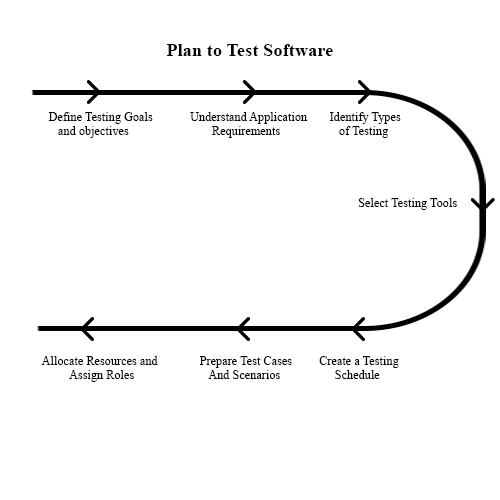Why Software Testing Matters
Let’s imagine you’re launching a new application or software in the global market without a complete testing process. In today’s digital world, users expect smooth performance. If an app takes too long to load, crashes unexpectedly, or puts their data at risk, users won’t hesitate to abandon it.
This is why software testing is essential for every digital product. Whether you’re developing a mobile app, business software, or an online platform, testing ensures smooth and lag-free functionality, strong security, and reliable performance. Alright, let’s get into the topic.
Here we explain seven crucial ways software testing improves your digital product

1. Makes Software Run Faster and Smoother
Nowadays digital users expect apps and websites to load quickly and run without delays and lag. The performance testing helps find slow areas, memory leaks, and high CPU usage that can affect speed. Testers simulate real-world conditions, such as heavy traffic or multiple users, to check how well the software responds. This helps identify bottlenecks before users experience them. By fixing these lag and delay loading issues early, your software runs more efficiently. A well-optimized app keeps users engaged and reduces frustration.
2. Protects Against Hackers and Cyber Threats
Cyberattacks are a big risk for all software and websites. Security testing helps find weak spots by running various tests like vulnerability scanning, penetration testing, and risk assessments. Testers simulate hacking attempts to see if attackers can break into the system. They also perform security auditing, posture assessments, and ethical hacking to identify potential threats. By testing areas like access control, session management, cryptography, and input validation, they ensure that all aspects of security are covered. Fixing these gaps protects user data from theft or leaks, builds trust, and keeps customers safe. Without proper security testing, sensitive information could fall into the wrong hands.
3. Ensures Reliable and Stable Performance
Reliable testing plays a vital role in the software testing process. Why because each user needs to trust our application before sharing their information. Reliability testing ensures the software performs well in all kinds of scenarios. It verifies that the app will continue to function smoothly over time, regardless of the conditions or usage patterns. By testing for consistency across different devices and environments, we can prevent issues like crashes or errors. This process builds user confidence, making sure they can rely on the app without worry. Ultimately, reliability testing ensures a dependable experience for every user.
4. Saves Money by Catching Errors Early
Fixing a bug and error after the software has been launched can be much more costly than addressing it during development. Software testing helps identify bugs and fix problems early in the process before they become bigger issues. By catching bugs and glitches during testing, you can avoid expensive fixes later on. This not only saves money but also reduces the risk of delays in the product launch. Early detection also prevents potential damage to your brand’s reputation. Ultimately, thorough testing helps ensure that the software is both high-quality and cost-efficient.
5. Improves User Experience with Easy Navigation
A confusing or buggy interface can quickly drive users away. Usability testing helps make sure that your app is simple to navigate, intuitive, and easy to use. Testers check UI (User Interface) /UX (User Experience) if users can find what they need without any frustration and if the app responds quickly to their actions. By identifying and fixing design issues, usability testing creates a smooth, enjoyable experience. When an app is user-friendly and visually appealing, customers are more likely to stay and return. A well-designed app not only satisfies users but also boosts your brand’s reputation.
6. Makes Software Work on Different Devices and Browsers
Your application or software should be suitable for all types of devices, including Windows, macOS, iOS, and Android, and also work seamlessly across various browsers like Chrome, Opera, and Edge. Compatibility testing ensures that your software performs smoothly regardless of the platform or all browsers used. Testers check for any issues that may arise on different systems, making sure the user experience stays consistent across all environments. This process helps prevent frustration caused by crashes or errors on specific devices or browsers. By ensuring your app works everywhere, you can reach a larger audience and provide a reliable experience. A fully compatible app boosts customer satisfaction and trust.
7. Speeds Up Launch with Automated Testing
Using automated testing helps to speed up the development process by running tests continuously. This process reduces the time needed to check every feature manually, allowing developers to focus on improving the software. With automated tests, you can quickly identify bugs, errors, and glitches to fix them, and make updates without delays. This allows businesses to release software faster, meeting deadlines and staying ahead of competitors. It also reduces human error, ensuring that tests are consistent and thorough. Ultimately, automated testing helps you launch your software faster without compromising on performance or reliability.
Final Thoughts
At Amtechie, we believe that software testing is not just a step in the process, but a crucial element for all successful applications. Our wide range of testing services—API Testing, Mobile Testing, IT Consulting, Cloud-Based Testing, Load and Performance Testing, Manual Testing, Security Testing, and AI Testing—ensures that your software performs at its best, remains secure, and offers a smooth user experience. By investing in our expert testing services, you are setting your business up for success.
Ready to launch a flawless application? Get in touch with Amtechie today for professional software testing!

